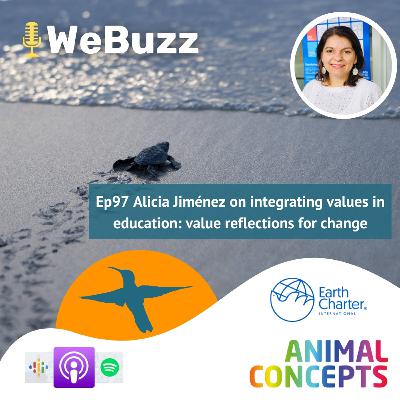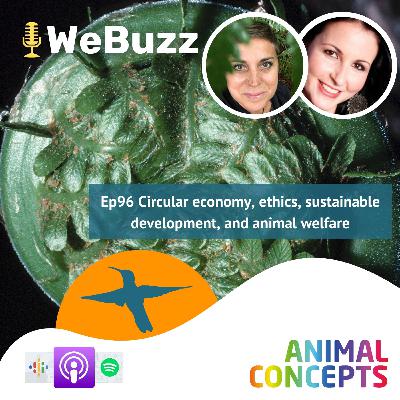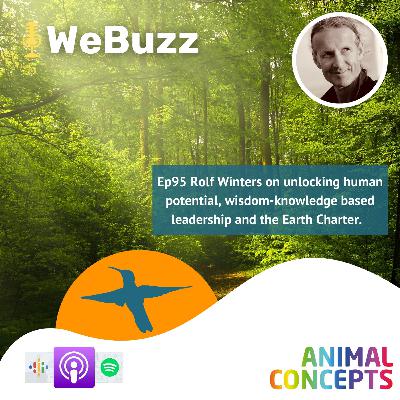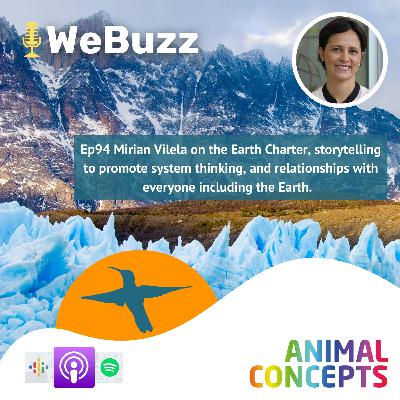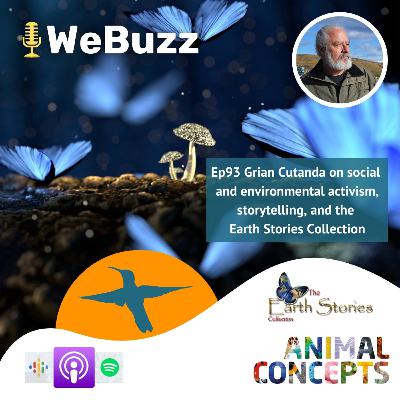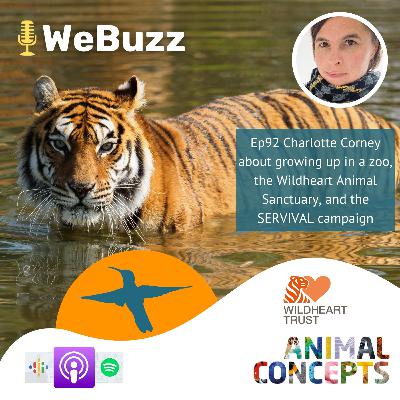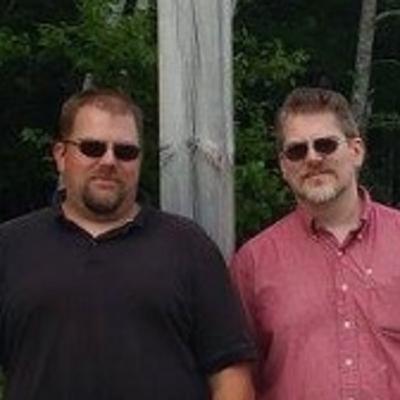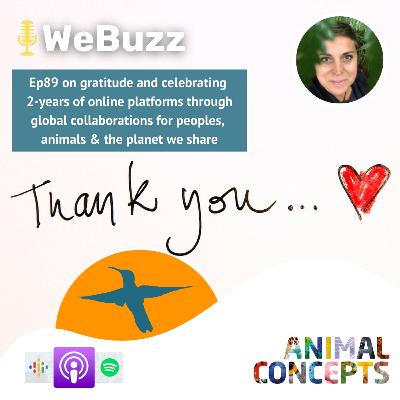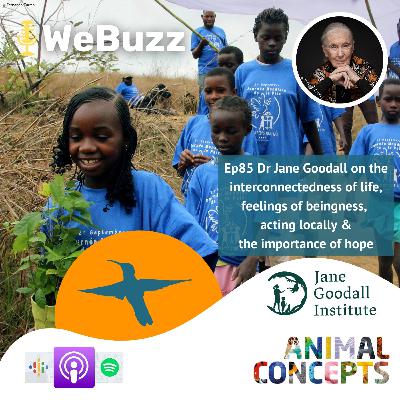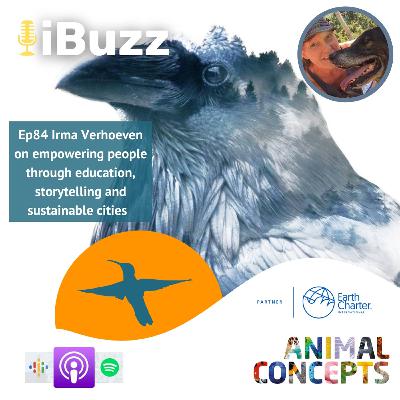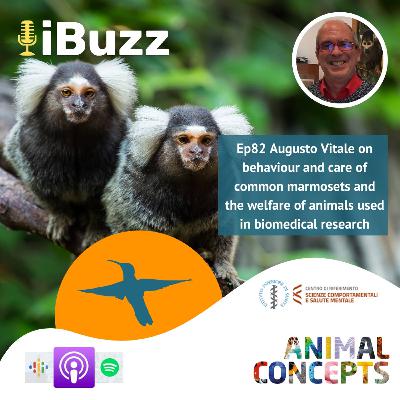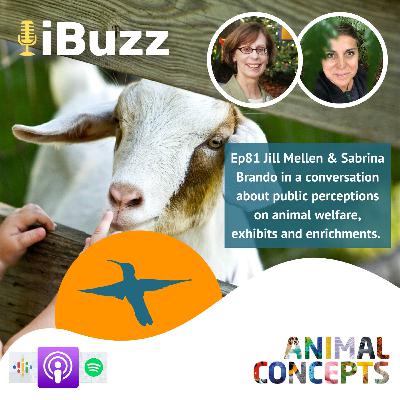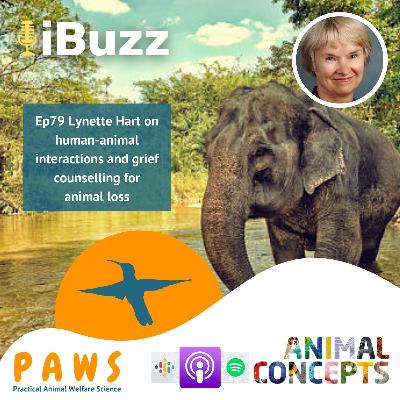Discover INTERBEING by AnimalConcepts
INTERBEING by AnimalConcepts

INTERBEING by AnimalConcepts
Author: AnimalConcepts
Subscribed: 8Played: 167Subscribe
Share
© 2024 INTERBEING by AnimalConcepts
Description
INTERBEING is the podcast series by AnimalConcepts with Sabrina Brando which includes a wide variety of topics, speakers, and viewpoints in the space of human, animal, and planetary wellbeing, as we are all interconnected, we all inter-are. Insights in animal welfare, conservation, education, and research, as well as humanities, art, and design, are some of the many topics you can enjoy and action on through this podcast. Reach out to us via our contact form about topics and questions you would like see covered, or speakers you would like to hear from, and thank you for listening!
98 Episodes
Reverse
“I realised this isn’t new, this interconnection, this view of holistic understandings of who we are… back to indigenous cultures” - Sam Crowell
This podcast utilises the audio from the webinar that took place on 30 April 2021 on the Planetary wellbeing platform by AnimalConcepts.
Let us welcome Dr Sam M. Crowell Jr. He is a professor emeritus from California State University, San Bernardino. He founded the MA in Holistic and Integrative Education and is a founding member of the Network in Spirituality and Education. He serves as a faculty member of the Earth Charter Education Center for Sustainable Development and has been engaged in the Earth Charter movement for several years.Sam informs us how his beginnings with his doctorate in the social foundations of education, influenced his career as a teacher. He enthused about how teaching, allows for collaboration and further learning. Furthermore, he highlights how his indigenous heritage has given influenced his teaching style and sense of identity. They then discuss the influence of culture, both animal and human, and how understanding them could be used to encourage a peaceful future.
“All my relations are our saving grace, it points to the truth that we are all connected. The most important word is ALL, not just those that behave like me, all, every person…” - Sam reading from Richard Wagamese’s book Embers.
The podcast concludes by explaining the prophecy of the Eagle and the Condor. The eagle represents human technological advancements, the condor represents spirit. The prophecy states that every 500 years their prevalence switches, however, currently, both birds are flying.
Read about Sam Crowell HERERead about the Visible and Non-Visible Nature of Collaboration in Education HEREFind out about the book; Embers by Richard Wagamese HEREFind out about Sam’s Science and Spirituality course HERE
“Education can change minds, if you can change minds, you can change mindsets, you change the behaviours and change the collective, so it is crucial”. - Alicia
This week’s podcast utilises the audio from the webinar interview led by Alicia Jiménez which took place on the 29th of January 2021 from the AnimalConcepts platform.
Let us welcome Alicia Jiménez, the Director of Programmes at the Earth Charter International Secretariat in Costa Rica. She has been working in the field of conservation and sustainable development since 1998.
The conversation discusses why it is essential to work together to maintain nature. However, this would require a new mindset, through cultural transformation to expand our perception and rethink our values. Education is a key player in this and can influence change. The Earth Charter can be used as a guideline to produce lessons.
The Earth Charter is a working document, containing sixteen principles within four pillars in sixty languages to promote a global impact by teaching a new way to relate to other living beings.
“Across zoos and aquariums, not many people I have spoken to have heard about the Earth Charter. So it is wonderful that we converse together to spread the word, the message and the values”. – Sabrina
Alicia, Irma and Sabrina then discuss the benefits of weaving stories into education especially in a zoo environment to create relatability and therefore teach people how valuable all life is.
“The Earth Charter has a global effect, putting together how we should live on this planet”. - Irma
Read about Alicia Jiménez HERERead the Earth Charter preamble HERE
This week’s podcast utilises the audio from the webinar interview led by Irma Verhoeven which took place on the 31st of May 2021 from the AnimalConcepts platform.
Let us welcome Tracey Starke, the founder of the environmental news website Ecolightenment, which brings together positive environmental news from mainstream media, as well as smaller NGOs to highlight the important work these groups are carrying out.
The circular economy is a way of living in harmony with our ecological systems and restoring them. It is based on the principles of designing out waste and pollution, keeping products and materials in use, and regenerating natural systems.
The conversation begins by discussing what a circular economy means to them and their industry. Circular economy is a method to live and restore the ecological systems by dealing with waste and keeping materials in use. From this, they examine methods in which to reduce waste within the animal industry, including the importance of stories in promoting change and the outcome of shifting minds.
Read about Ecolightenment HERE
“Crises offer an invitation to do things differently. Embracing this opportunity clearly demands an overhaul of what is considered ‘leadership’ in our society. We need to up our game! What we need are masterful warriors with a crystal clear vision and the ability to incite the necessary inspiration, creativity and faith that catalysis transformational change. We need wise leaders instead of smart managers.” - Rolf Winters
Let us welcome Rolf Winters to WeBuzz. He is an explorer of life, a leadership coach, a public speaker, and Wise Leaders Ltd founder.
Rolf starts by explaining how the meaning of success is fluid and changes every few years, as well as being subjective to the individual and what they had aimed to achieve. He explains how in his profession, he aims to promote the spirit of an individual and groups.
Rolf shares with us about when he and his family lived with a clan of native Americans. They took themselves out of the Western system to live with nature and learn a new perspective of life. This five-year journey, which includes a year of global travelling, taught them to view everyone, no matter the age as equals, and all hold wisdom which we can learn from. Following this, Rolf produced the documentary DOWN to EARTH intending to spread the brilliance of the clan. In later years, he noted that the Earth Charter shares similar visions to the clan.
Critically, Irma and Rolf highlight that being a leader is to serve your community and remain empathetic. He works with corporations around the world to promote change for the betterment of the Earth.
Irma concludes by saying “The wiser we get, the more we realise how little we know”.
Find out more about Wise Leaders Ltd. HERE
Find out more about DOWN to EARTH HERE
Find out more about the Wisdom-based Leadership master class HERE
Become a member HERE
"It’s important to emphasise that a key purpose of the Earth Charter is to expand and deepen a consciousness with regards to how we ought to relate not only with ourselves, and with others, but also how we ought to relate with the large living world." - Mirian Vilela
Let us welcome Mirian Vilela who is the Executive Director of the Earth Charter International Secretariat and the Centre for Education for Sustainable Development at the University for Peace (UPEACE). Additionally, Mirian coordinates the UNESCO Chair on Education for Sustainable Development with the Earth Charter.
Mirian first introduces us to her upbringing in Brazil on her father's farm, and how this cultivated a connection to nature.
Irma and Mirian then discuss what is the Earth Charter, how it was born from common human shared values and how the Earth Charter played a key role in Mirian’s life, giving her a voice. They also share the importance of telling stories to promote system thinking to establish relationships with everyone including the Earth.
“Our favourite story is the flight of the hummingbird, it's an inspiration to act on behalf of the world’s limited and precious resources, this is very much in line with the vision of the Earth Charter” – Irma Verhoeven
Mirian concludes by telling us a couple of stories, including one where a relationship formed with the Earth in that instant.
Read about the Earth Charter HERE
Become a member HERE
Grian A. Cutanda has a PhD in Social Education from the University of Granada (Spain) and a Degree in Psychology from the University of Valencia. He is an author of fiction and essay, with 16 books published, some of them translated into 12 languages, and a number of academic papers and chapters at the request of various universities. To highlight his international bestseller The Gardener, published in English by Thorsons (HarperCollins) in 1998.
Social and environmental activist, Grian has been an organiser and coordinator in different fields within social movements such as the Indignados Movement in Spain, forerunner of the Occupy Movement in 2011; the People’s Climate March in 2014 and the subsequent 2015 climate campaign in Edinburgh (Scotland); and Extinction Rebellion, as co-founder of XR Spain and regional liaison for Latin America in XR International. The impact of his environmental activism reached an international level with a documentary screened at the Royal Anthropological Institute Film Festival, The Earth Stories Collection, or How to End Modernism Once and for All (Cutanda, Kendall & Borecky, 2021) and when, in September 2021, he held a 33-day hunger strike as part of the Global Earth Fast campaign organised by Extinction Rebellion from the UK. This made him, along with Karen Killeen, the activist who held his hunger strike against climate change the longest in the world.
Founder of the Avalon Project – Initiative for a Culture of Peace, Grian has been linked to the University of Granada as a researcher. His main research led to the creation of The Earth Stories Collection, a global bank of worldwide traditional stories capable to transmit an ecocentric and systemic worldview, illustrating the different principles and fragments of the Earth Charter. In this line, he is also working, with the partnership of the Earth Charter Secretariat at the United Nations’ University for Peace and the Scottish International Storytelling Festival, on spreading these stories through the creation of a global network of storytelling activists, Earth Story Tellers.
Become a member HERE
Let's welcome Charlotte Corney, the former CEO of the Wildheart Animal Sanctuary in the Isle of Wight and the founder and trustee of the Wildheart Trust.
Charlotte tells us of what it is like growing up in the Isle of Wight Zoo (now the Wildheart Animal Sanctuary), and how agreeing to hand-raise Zia the Tiger cub committed herself to work with animals. She explains the journey from a zoo to a sanctuary, yet emphasises that throughout the sanctuary's history, each animal's life has always mattered.
“One thing, to this day, remains absolutely unshiftable, and that is that individual life matters to each and everyone of our animals, and never ever were our animals a commodity. The animal's life always comes first”.
Each animal in their care acts as an ambassador animal to promote the conservation and protection of animals. Charlotte gives us an example of SERVIVAL, a campaign to ban the breeding of exotic felids, such as Servals, with domestic cats. These ambassador animals contribute a small part to the human experience at the sanctuary, which overall contributes to promoting a change in thinking through empowerment.
“They come in, they learn a few facts that they may have been able to find out on Wikipedia, then they go home. It is not good enough now. We need people to go home now and do something different, think something differently. Make some difference. It is small steps”
Charlotte concludes by telling us the story of her four hand-raised tiger cubs, and how she and the Isle of Wight said goodbye to her last surviving cub Aysha.
Read about the Wildlife Trust HERE
Listen to our podcast with Dr Jane Goodall HERE
Become a member HERE
“Most people used to say, the Amazon is like the lung of the planet. I say it is like the heart. If you see the Amazon, you can see a heart and all the rivers are like veins. When you clog all these veins, the body is going to collapse. This is happening now."
Let us welcome Dr Fernando Trujillo, a marine biologist who is the Scientific Director of Foundation Omacha, an NGO he established in 1993 to promote the conservation of river species and their ecosystems in South America.
Fernando guides us through his studying history, achieving an MSc in Environmental Sciences (University of Greenwich) and a Doctorate in Zoology (University of Aberdeen) with the ambition of working with marine vertebrates. He was encouraged to work with dolphins in the Amazon. Although nervous, this place became his paradise so built his career around it. Fernando’s PhD allowed him to research Amazon River Dolphin behaviour, and habitat use and develop a technique to count them. From here, he developed the South American River Dolphin Initiative.
“Each tree is an ecosystem, 50 m high, there are hundreds, if not thousands of animals; ants, insects, spiders, frogs, mammals and reptiles. So every time you burn an area, you are killing millions of animals and plants."
Fernando informs us about the importance of the Amazon to the world, and how damaging it will affect everyone. Fernando and Sabrina then discuss the development of Foundation Omacha and its impact. They then discuss the perception of the residents and indigenous people to conservation and how it changed over time.
Throughout Fernando’s career, connections are key in conservation. Connecting indigenous people to wildlife, and westernised people to indigenous to learn from each other and promote change to benefit everyone.
“We need to learn, we need to move forward, we need to be committed to something. It’s important. It’s not a fight of a few people. It’s a fight with everybody. We are all on this amazing blue planet that we all call Earth, and we need to do something”
Read about Omacha HERERead about the Amazon River Dolphin HERERead about Fernando’s Whitley award HERE and Fernando’s work HERE
Become a member HERE
“I think one of the things we should do, and that I am experiencing more and more, is that, in order to think differently we have to look to the past, to find out why we are thinking as we are thinking right now”.
Let us welcome Jes Lynning Harfeld, an associate professor of applied ethics at the Centre for Applied Philosophy at Aalborg University, Denmark. Currently, his research focuses on the connections between animal welfare and ethics in the realm of human-animal interactions and the way that language interacts with thinking and character.
It was not until Jes’s PhD when he came across Peter Singer’s Animal Liberation, did he develop an interest in the ethical dilemmas regarding animal welfare. As such, he focused his thesis on the ethical dilemmas of modern agriculture. Querying, what it means to have a find and the different approaches of ethics and how it relates to animals. “Animal welfare understandings as types of interpretations, reading their signals then jumping to conclusions."
Jes and Sabrina then discuss the ethics and the varying interpretations of animal welfare, an intrinsically subjective phenomenon, across different audiences. Jes then, using a couple of his papers, explains the development of animal welfare sciences.
“Making barriers between disciplines is one of the things that is not a good thing for animal welfare science, we have to break down disciplinary boundaries to do even better animal welfare science”
Read about ‘What is animal happiness’ HERERead about ‘Rights, solidarity, and the animal welfare state’ HERERead about ‘Bearing Witness’ by Class Kirchelle HERE
Become a member HERE
“That is the real beauty, we often talk about global collaboration for animal welfare, or global collaboration for human wellbeing or for the greater community of life, or the planetary… What makes it so strong, is these different expertise, these different interests, these different talents, these different things that people bring… to effect change and the only way we can do that, is of course, is by doing it together.” - Sabrina Brando
Hummingbird Stories
AnimalConcepts Public Facebook Group
Elephant Care & Wellbeing
“We have a mission to connect people with nature to inspire stewardship for nature through those connections!... An emotional connection with nature through spending time in nature is more important than environmental education for inculcating that sense of stewardship in children… an important part of conversation”. - Suzanne Gendron
Let us welcome Suzanne Gendron, the Director of Sage Advice Consulting and the Former Executive Director of Zoological Operations and Conservation at Ocean Park Hong Kong.
In this episode, Suzanne shares with us the importance of educational opportunities outside of school to promote stewardship through creating a connection to nature.
Suzanne explains how Ocean Park aims to support Asian biodiversity and the strategies it has implemented to achieve this. She highlights crucially how conservation problems are not going to get better without cooperation.
Suzanne then shares some of the educational activities Ocean Park employs to inspire others to take small actions to help conservation species.
Suzanne then shares the work of Sage Advice Consulting, and how she utilises her 40 years to provide valuable insight to facilitate improved animal welfare, conservation and education, thus, positively impacting the conservation of animals.
To conclude, Suzanne shares with us her love of scuba diving and her awe-inspiring dive with Whale Sharks further inspired her love of the sea.
Read about WAZA’s Social Change for Conservation Strategy HERE
Read about Ocean Park’s implemented conservation HERE
Become a member HERE
"Everyone has 1 life. Me, you, and each animal in our care. Let's bring awareness to what seems so obvious, and embody I SEE YOU" - Sabrina Brando
Join Sabrina Brando in thinking about the 1 life we all have. On how we can make a difference, through the methods and approaches we use, patience and loving-kindness.
Sabrina discusses bringing attention to the effect of our language around other animals and nature, and how this can shape the ways we think and act.
She shares some recent insights and experiences with animals and a valuable lesson from Metallica.
Sabrina briefly discusses her perspectives around the 'I SEE YOU' concept she developed. Of bringing together our heart, mind, gut, and senses, and many other important aspects, and to stay connected 'seeing', in the broadest sense, for animals, peoples, and this beautiful planet we share.
Access 24/7 across lifespan information and resources HERE
Watch the EAZA webinar on Back-of-House with Sabrina Brando & Jon Coe HERE
Become a member HERE
“Every single individual impacts the planet in some way, big or small everyday. Every individual has a role to play”. - Jane Goodall
“If we find the right organisations to collaborate with… and to share values about the sanctity of life, whether it's animal-human, human-animal, we’re all one! And yet, we’re different, so we are responsible for the harm we are causing around the globe”. - Jane Goodall
“Every species of animal and plant has a role to play. It was all connected. It’s like a tapestry of beautiful colours, a living tapestry of life. As a species becomes locally extinct, it is like pulling a thread, from that tapestry, and enough threads are pulled, then that tapestry will hang in tatters, and that ecosystem will collapse, and we have to realise, we are apart of the natural world and not only that, we depend on it for everything”. - Jane Goodall
Let us welcome Dr Jane Goodall DBE, who has worked for nearly 60 years protecting chimpanzees. Her work has led to conservation incorporating the needs of the local people as well as the environment.
In this episode, Jane shares with us the importance of interconnection through finding common ground to improve the effectiveness of conservation strategies.
Jane explains the role of the Jane Goodall Institute and its sanctuaries in helping both the chimps, the environment, and the locals and how it can be used to promote ecotourism.
Jane then explains the importance of networking communities and connecting youth in order to promote positive change for animals and the environment through her programme ‘Roots & Shoots”.
To conclude, Jane gives us reasons for hope and informs us of its importance within the world. She explains how hope is inspiring, and how it spreads easily sparking action. Sparking change.
Learn more about the Jane Goodall Institute HERE
Learn about the Pan African Sanctuary Alliance HERE
Watch Wounda’s release HERE
Become a member HERE
In this episode, we connect with Irma Verhoeven who is a professional educator and a program and partnership development manager with Earth Charter International. Irma will share her insights and experiences on why education plays such an important role in human behaviour changes and empowerment.
Irma shares her experiences of working with Indigenous Peoples, and how this has influenced her work as an educator, including learning from, through and with others.
As a Programme & Partnership Development Manager with Earth Charter International, Irma shares how the Earth Charter can be useful for educational organisations as well as zoos and aquariums.
In concluding the podcast Irma shares her work with World of Walas, as cofounder and education advisor, specifically focussing on educational efforts in relation to more participative and sustainable cities, and how education supports a more just, sustainable, peaceful, and ethical society.
Become a member HERE
“Changes in how we react with animals… it’s not all about food. The animals are going to get their food anyway, there is so much more to the relationship” - Sabrina 2022
“It’s important that we’re doing research to help animals that are in the wild. I believe a big reason that we have these animals is not for money or entertainment, but it's for education, conservation and research…” - William Winhall
Today we welcome William (Bill) Winhall, the Manager/Principal Consultant at Marine Mammal Care Consulting LLC and who has a very long career in marine mammal care and welfare.
Bill tells us that although he has always had an interest in nature, his first ambitions lay with becoming a professional baseball player. However, due to injuries, he decided to study for a degree in Biological Sciences (Marine). Bill then told us of his career ladder, starting as a Tour Boat Operator at Marine World/Africa USA.
Bill then shares with us how marine mammal training has changed and the importance of collaboration in training with animals and colleagues. He also provided us with many examples, for example, Cocoa the Pilot Whale. Bill also explains the importance of the Alliance of Marine Mammal Parks & Aquariums inspecting and sharing the best practices to improve care.
Bill also shares with us how understanding animals in captivity is critical in helping animals in the wild to conserve and restore habitats and species.
Bill concludes by sharing stories about training a young dolphin and a young sea lion, explaining the importance of understanding the individual to alter training to fit their needs.
Read about the Alliance of Marine Mammal Parks & Aquariums HERE
Read the Polar Bear Care Manual HERE
Become a member HERE
“In this endless discussion [about animal experimentation] we completely forget that animals are used now and they need our attention now.” - Augusto Vitale & Sabrina Brando
Dr Augusto Vitale joins us to share his experience in the study of non-human primate behaviour and welfare. Since 1991 Augusto has worked as a researcher at the Istituto Superiore di Sanità in Rome (Italy) dedicating his scientific activity to investigate behaviour, cognition and welfare of non-human primates, with a focus on common marmosets used in neuroscience and biomedical research.
He guides us in discovering the work of ethologists and evolutionary biologists who contributed to unveiling key aspects of animal behaviour and cognitive skills. He passionately illustrates his research on cooperation and describes how studying common marmosets’ behaviour can shed light on the evolution of altruism in humans.
Augusto also shares with us his work in the EU Expert Working Group responsible for creating guidelines on the protection of animals used in scientific procedures. He discusses the use of animals in experimentation, providing meaningful insight into the current legislation and ethical debate. Augusto concludes by telling us about his strong bond with animals and highlighting the importance of positive human-animal interactions for enhancing captive animal well-being.
“It’s really important to understand what our zoo visitors are seeing, feeling and understanding, because we want them to be a full partner in how we manage and take care of animals” – Jill Mellen
"Our interpretations of what we may think of our own animals at home versus wild animals in our care... We have lots of similar problems... We could bring visitors along in learning to assess the wellbeing of animals and how this can be used with their own animals" - Sabrina Brando
Jill Mellen joins us once again to discuss with Sabrina Brando how the public perceives the welfare of animals housed in a zoo. They explain how understanding this perception is important in the planning of management strategies.
Jill shares with us how zookeepers are the critical mediator in making a positive experience, by taking the time to interact with visitors to divulge knowledge. They remind us how some domestic species share behaviours with many species in the zoo and reminding visitors of this can potentially improve the welfare of their pets.
They discuss how media detachment can alter the narrative of work achieved in zoos, making zoos and aquariums appear that they are not doing right by the animals in their care.
Jill and Sabrina conclude the podcast by offering several suggestions that could be implemented into zoos to increase positive public interactions.
Listen to Jill and Sabrina’s previous conversation HERE
Become a member HERE
“Not everybody is convinced that a zoo can offer these conditions ... in most zoos, there is a great awareness that this is one of their biggest challenges - to give animals a natural environment in which to develop their natural behaviours" - Jan van Hooff
Jan van Hooff joins us once again to share more stories about the chimpanzees, led by Mama, living at the Royal Burgers Zoo. He shares with us more tales of coalition behaviour in primates from his time with Mama and the Arnhem chimps, during a time when there was a great interest regarding the functions of aggression in the life of social animals.
Jan explores the topic of how social groups are formed and maintained, and the importance of giving and taking in forming a community that benefits all members involved. He discusses how coalitions form, supported by the work of his PhD student Frans de Waal. Jan goes on to retell the development of relationships between the Arnhem Zoo chimpanzees, as observed by Frans, and how these observations went on to inform our current understanding of chimpanzee aggression, bonds and reconciliation.
Jan shares fond memories of the chimpanzee matriarch Mama, and her role as a mediator between the males. He shares stories of the tolerance and caring displayed by Mama throughout her life, which he observed directly as he formed bonds with the chimpanzees. We conclude with a beautiful story of recognition and reunion between long-time friends.
Check out Jan van Hooff’s publications HERE
Listen to the previous podcast from Jan HERE
“My focus was to study the social aspect of companion animals and how they change our social relationships with people.” – Lynette Hart
Today we will hear Dr Lynette Hart as she delves into the world of Human-animal interactions, grief counselling and animal behaviour research, which she was happy to be a part of at a time when women with PhDs did not find suitors!
As she tells how Leo Bustad pioneered in talking about the human-animal bond and vulnerable people, she asserts that ‘interaction’ best describes the positive and negative aspects.
She shares her part alongside others in popularising grief counselling for the loss of animals as a valid aspect of the human-animal bond. She tells how addressing grief is important for pet parents, veterinarians, animal laboratory workers and zookeepers.
Listen as Lynette talks about a unique volunteer-based animal behaviour research on flehmen behaviour in ungulates, her work on elephant infrasound communication in collaboration with a geophysicist, collaborations with students to study elephant yawning, elephant-people interactions, elephant-caregiver bonds, effects of household noise on companion animals (inspired by her dog Ginny!).
Excited and intoxicated by this science, Lynette feels the greatest resource of this field is the burning interest and energy that people have in it rather than monetary funds. Look out for some interesting publications coming our way from this amazing mind!
To know more about Elephant-caregiver interaction click HERE
To know more about grief counselling click HERE
To know more about elephant infrasound communication click HERE
Become a member HERE



